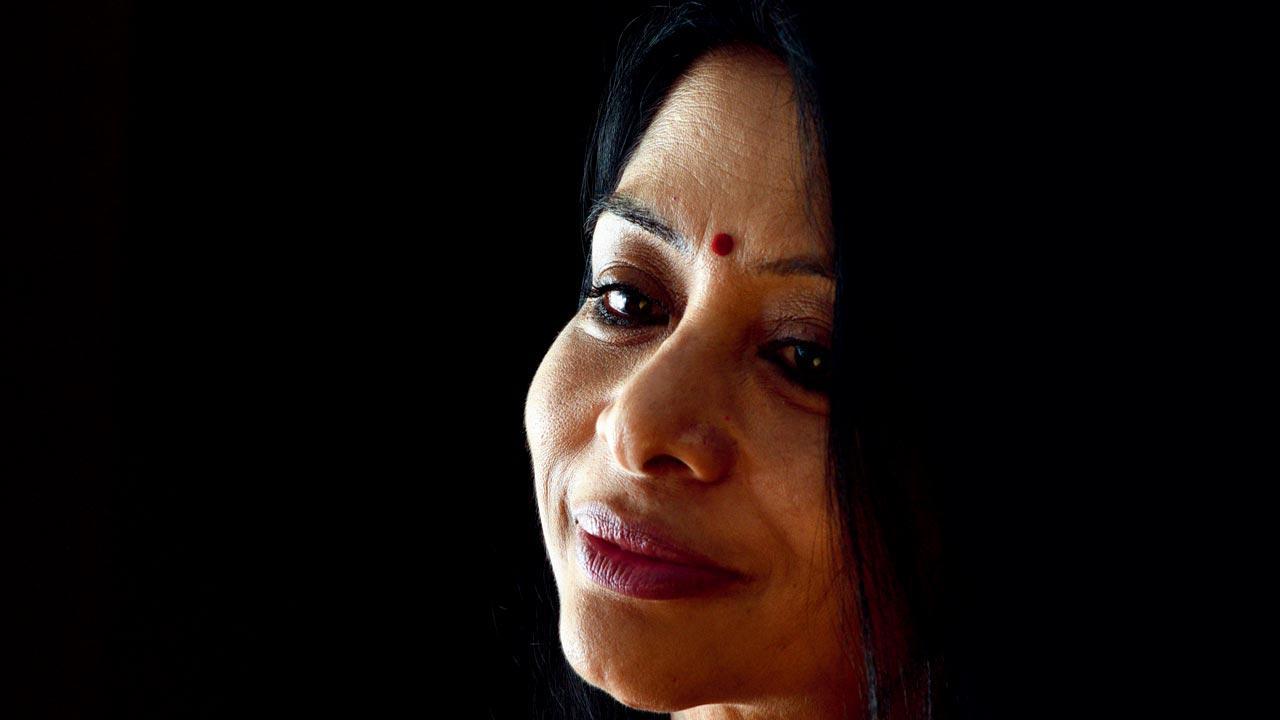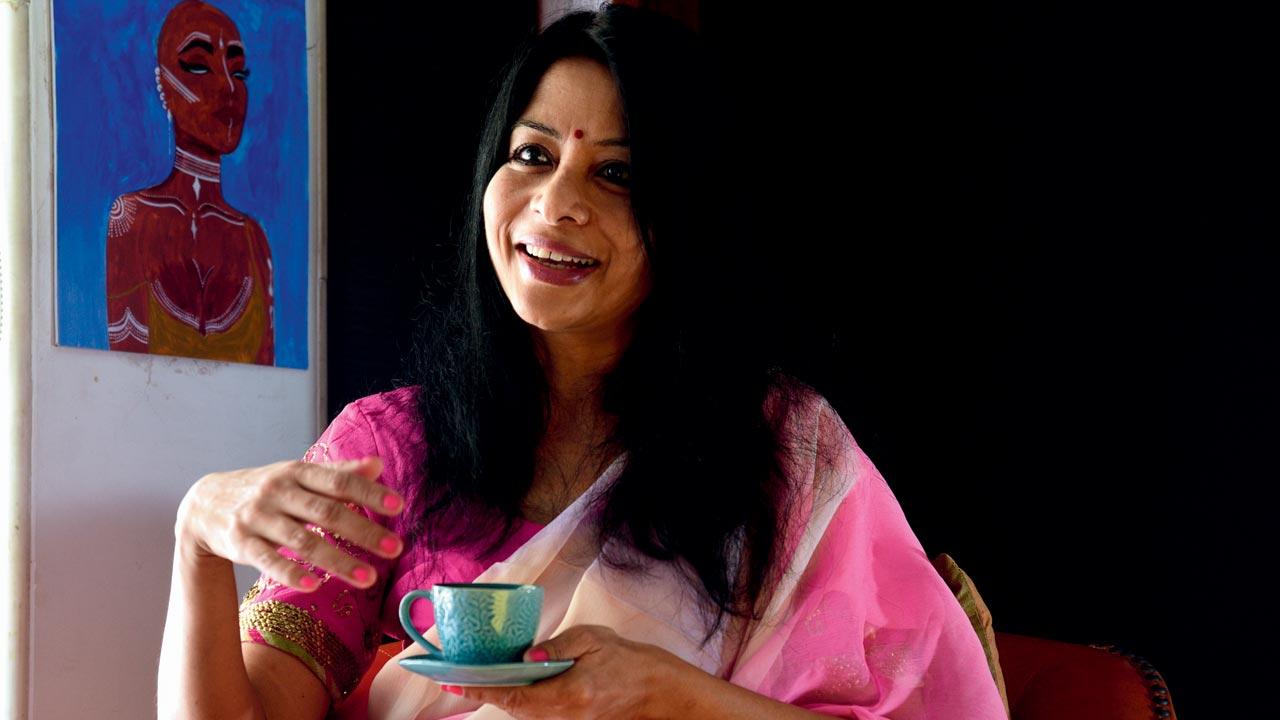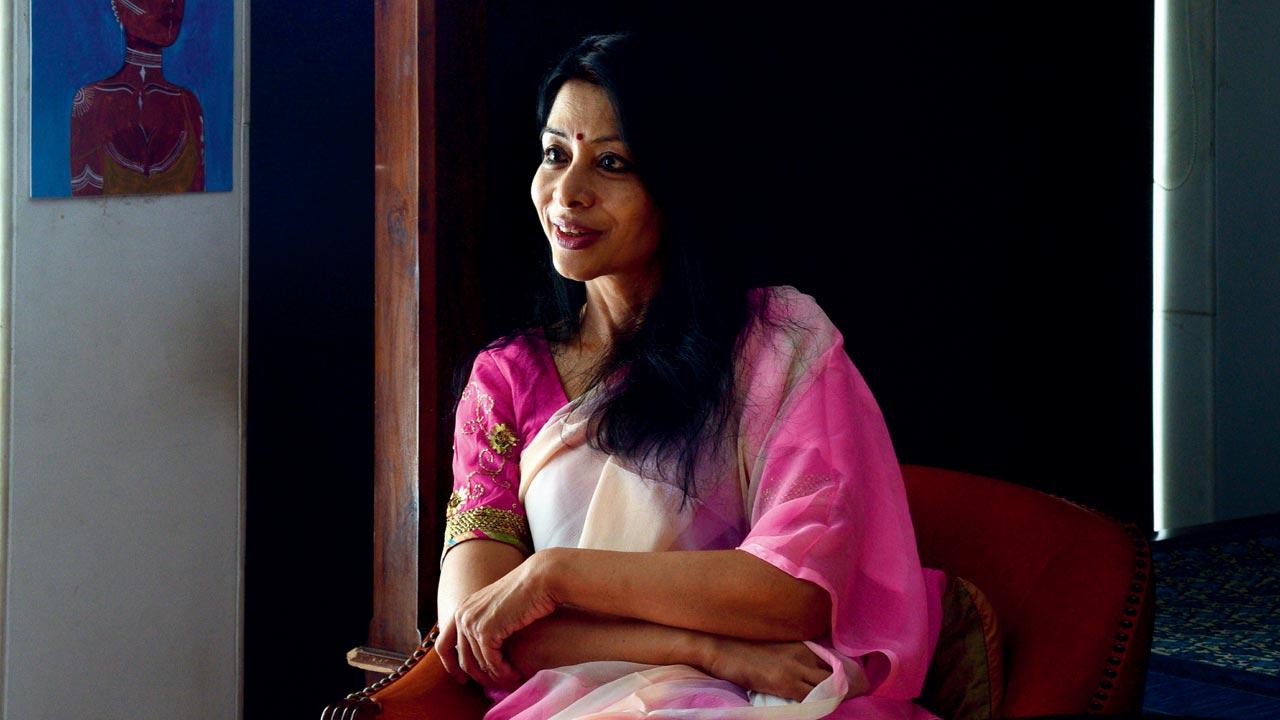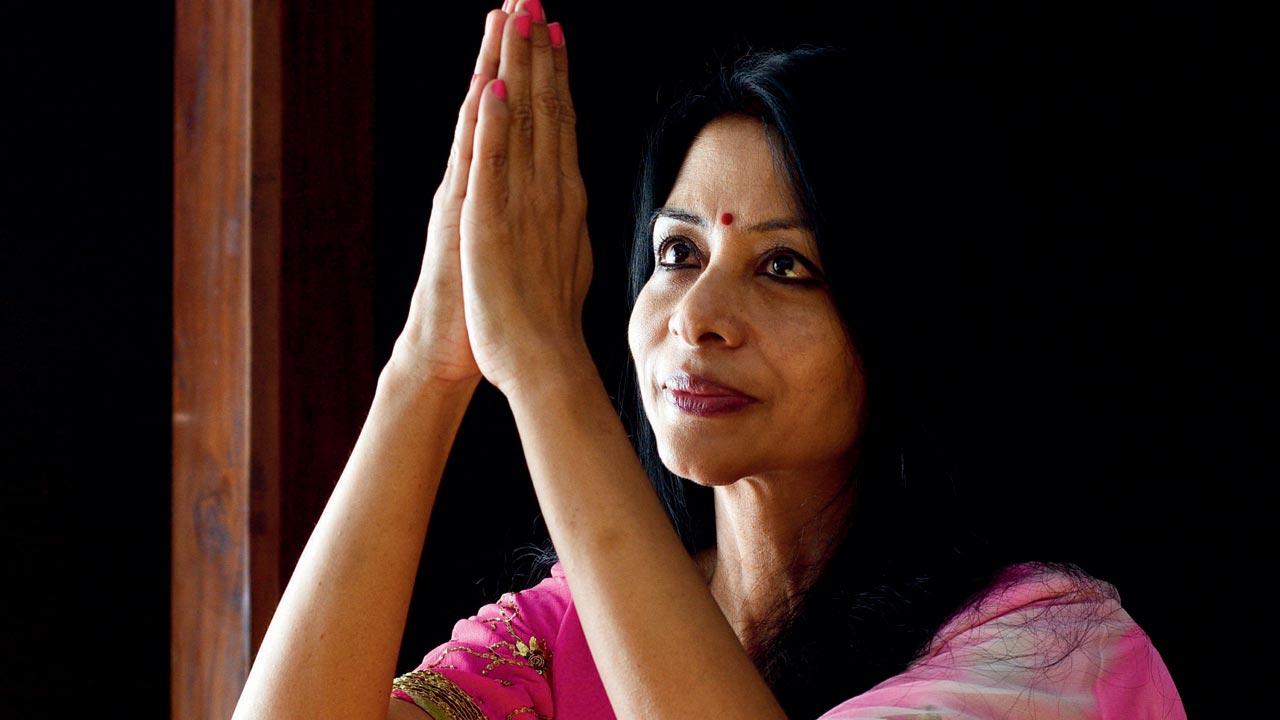In her first candid, in-depth interview after leaving Byculla jail where she was lodged for six years, Indrani Mukerjea, accused of murdering daughter Sheena Bora, talks about starting from zero, with new friends, old family and a city that shunned her

Pic/Ashish Rane
The biggest conundrum that most journalists grapple with in their lifetime is questioning without judgment. Being objective—a word used and abused in equal measure—can often be limiting, especially in the pursuit of truth.
This makes it harder to practice it, we are thinking to ourselves as we wait outside the gates of Marlow CHS on Pochkhanawala Road in Worli. It’s 9.45 am; we are 15 minutes ahead of time.
ADVERTISEMENT
The subject of our interview, Indrani Mukerjea, has requested 10 minutes before we can be escorted up by her driver. Mukerjea, once a media executive, is prime accused in the 2015 Sheena Bora murder, out on bail barely a fortnight ago, in a criminal case of a mother killing her daughter, considered as one of the most sensational to emerge out of Mumbai in recent times.
 Pics/Ashish Rane
Pics/Ashish Rane
At five past 10, the security let’s us in. The driver accompanies us up to the studio apartment. No words are exchanged, until we reach the flat, where Indrani is waiting at the door.
Six years and nine months ago, on August 25, 2015, Indrani was arrested from the same building by the Mumbai Police on charges of murder and kidnapping. Sheena, who had been missing since April 24, 2012, was the daughter of Indrani with her ex-partner, Tripura-based Siddhartha Das. That Indrani was the wife of once media baron and Star TV CEO Peter Mukerjea, and a media executive herself, took the ordinariness out of an already shocking story. Indrani has since been shuttling between courtrooms and the Byculla Women’s Jail, from where she was released on bail on May 20.
She is wearing a blush pink chiffon saree; her feet in home chappals. She offers us tea, but we settle for water, which she pours out from a mineral water bottle into our glasses. “I have too many of these,” she says.
The apartment is small, but roomy—there’s a two-seater in front, an open kitchen on the left, and a four-poster bed on the right. MF Husain’s art crowds a wall, as does Pablo Picasso—all part of Indrani’s hand-picked collection. This is her temporary base. “Vidhie [Indrani’s youngest daughter] used to stay here, when in Bombay. Our flat was a floor below. I am gradually settling in, and after having spent more than six-and-a-half years in confinement, inside a cell, I actually prefer something smaller,” she says, as she settles into a leather sofa. Since the matter is subjudice, Indrani won’t speak about the case. “There has to be an element of trust,” she tells us.

The last couple of days have been a blur. “My day is looking really full at this point. I’ve been sorting out my home, all my bank accounts and getting manpower together. But most importantly, I am trying to re-establish contact with people, who I feel will qualify to stand surety for me. I’ve lost all my contacts. My phone was confiscated and is still in court, so is my computer. That’s made it a bit difficult.” The special CBI court, upon her release, had directed Indrani to furnish a personal bond of Rs 2 lakh with one or more local solvent surety, within two weeks. On Thursday, she sought a four-week extension for the same. “There are a lot of conditions [for the surety]. The person has to be known to me, should be a local and have a place of his/her own in Mumbai. Also, this person can’t be a lawyer, or else one of my lawyers could have appeared as my surety. I am primarily focusing on getting this done as soon as possible.” Her search for a local surety crops up one too many during the interview—the struggle, we deduce, is real.
Nobody wants to go to prison,” Indrani says, of the time when she was arrested. “It was a shock to my system… a challenge thrown very unexpectedly at me. I’ve never jumped a red light in my life, nor had I ever visited a police station prior to my arrest. Not even in my wildest dreams did I imagine myself being accused of murder and that too of someone in my family.” Emotionally, she says, “I was in pieces.” She, however, claims that nothing hit her as hard as the implications that her eldest child Sheena was no more. “That caused a huge emotional upheaval within me. It’s one thing if somebody doesn’t want to talk to you for the rest of their life and that happens in any family,” she says, adding, “The incarceration was no doubt difficult. But I was not worried about the incarceration as much as the possibility of Sheena not being there… that was disturbing,” she adds.
In an interview, Indrani’s lawyer Sana Raees Khan claimed that there was enough “CBI evidence” to establish the fact that Bora had been exchanging messages with her fiancé Rahul Mukerjea—Peter’s son from his first marriage and Indrani’s stepson—till until September 2012, which is almost five months after she had gone missing. “These are DFSL [Directorate of Forensic Science Laboratories]-certified messages that have been retrieved from Rahul’s phone,” Khan had maintained in the interview. Indrani tells us she is “grateful” that such evidence actually exists. “It’s a relief to know that she could actually be alive. That makes me feel emotionally better… just the fact that she could be somewhere out there.”
In November 2021, Indrani, in a letter to the CBI, had also claimed that an inmate—“a female government official”—had told her that Sheena was seen in Srinagar, Kashmir. The CBI, however, called the claims “imaginary” and “next to impossible”. “Sheena Bora is dead and she was killed by Indrani Mukerjea in conspiracy with other co-accused,” the CBI had said in its reply filed before the special court, in March this year.

At Byculla Women’s Jail, Indrani was housed in a separate cell. As an undertrial, she didn’t engage in any hard labour. “The prison routine was surely different from the life I led prior to my arrest. It didn’t upset me majorly, except for the fact that I would get locked in my cell at 5.30 in the evening. That was a bit tough, at least initially. At home, you are not used to somebody locking you from the outside.” Indrani says she spent most of her time reading—books and newspapers that she had subscribed to—writing, doing yoga, praying and connecting with other inmates. “I was very conscious about abiding by the prison rules, in every possible way and tried to spread a lot of positive energy. I also became very spiritual—I learnt to recite the Mahamrityunjay Mantra, Hanuman Chalisa, Shani Chalisa, Gayatri Mantra and Bagalamukhi Kavach regularly.”
Indrani points to a shelf in her apartment, where she has placed cutouts of pictures of Lord Ganesha, Goddess Laxmi, Dattaguru that she found in newspapers and magazines. In her cell, she says, these pictures were placed atop a cardboard box, covered with a magenta-dupatta—the best she could find. “That was my temple. I would sit and talk to them. I derived a lot of positivity and strength when I did that. Prayer became a big part of my life. I would spend at least two hours praying every day,” she shares, adding, “I brought all these pictures with me.” The writing inside the jail includes completing 23 chapters of a two-part book. “But I cannot talk about it right now.”
Interestingly, Peter, now her ex-husband, also published a book last year, part memoir and part story of the Indian television industry. He, however, refrained from talking about the case, which drove a wedge between him and Indrani. Peter was arrested on November 19, three months after her, on charges of causing disappearance of evidence and giving false information to screen an offender.
Bora is alleged to have been strangled in a car and her body dumped in a Raigad forest. The CBI chargesheet mentioned Indrani, her then driver Shyamvar Rai and her first husband Sanjeev Khanna, as accused.
In April 2018, Indrani sought a divorce, and sent Peter a legal notice at Arthur Road Jail, where he was then lodged. The couple was granted divorce two years later, in October 2019. While Indrani says that she hasn’t given a thought to giving up the “Mukerjea” surname, she says that things had changed between the couple on the day of her arrest itself. “Police officials in civil clothes had picked me up from an orphanage called Anand Niketan in Mahalaxmi and brought me home, but refused to tell me what I had done wrong. They told me that there had been an accident, and that they wanted to question me regarding the same. When Peter returned home after a couple of hours, the police took him to the balcony and told him why I was being questioned. It was Peter who first broke it to me—he said I was being charged for the murder and kidnapping of Sheena. My instant reaction was that this was utter rubbish. But, it’s at that moment, when I saw a sudden change on Peter’s face. I remember that expression till date, and I’m trying to come to terms with what that was all about. Honestly, I am still at a loss.”
She says that what broke her was when the police said that she’d need to come with them for questioning. “I started crying, and hugged Peter, begging him to do something. Normally, he is great hugger. But that day, I felt like I was hugging a stranger. He was cold and distant. As a woman, I am very intuitive. That was the day I realised, that Peter wasn’t going to be there for me. I think he distanced himself from me, the moment he was told about the accusations against me.”
In the days following her arrest, Indrani says she yearned to see Peter in court and the police station. “But, he never showed up.” Neither did he come for any of the “mulaqats” in prison. In one of the letters that Peter wrote to her, she claims, that he spoke about continuing with the plan of celebrating his 60th birthday in Goa, in November 2015. “I thought to myself, whether this was even for real. He doesn’t get time to see me, but was busy making plans to celebrate his birthday.”
His alleged decision to oust her from his insurance policies, investments and properties, some of which she claims they had jointly owned, turned matters on its head. “I had no siblings. My mother died 15 days after I was arrested. My father died later of a heart attack. I had lost all family support. Initially, I was angry and hurt. But as I started meditating and doing yoga, I began to let go.”
Indrani says that Peter started re-connecting with her after he got arrested two days prior to his 60th birthday. “I think he realised what it was to be arrested for something one had not done, and perhaps, even regretted taking the stance of abandoning me after my arrest. It’s possibly why I am still cordial with him [after all that has happened].”
Despite the divorce, Indrani says “she still cares for Peter”. “I have always loved him. Love doesn’t cease to exist. Tomorrow if he needs me because he is unwell or going through a bad phase, I will leave everything to be by his side. But I do not think I will ever take that leap of faith with him anymore as a partner or a spouse.”
At this point in the interview, Indrani takes a break for tea. This is her second cup in an hour. Her house help, who is in the pantry, has been trying to get her attention. Indrani senses her restlessness, and asks if she wants to leave for the day. “They [the house staff and some junior ex-employees] are my new friends. They are even willing to stand as surety for me. Meanwhile, the people I used to think were my friends are calling me for luncheons and dinners… yet none of them have offered this kind of help to me. Now, I feel I’d rather get to know the people living in the slums and chawls of the city. The prison walls have broken the outside barriers for me,” shares Indrani, hinting that she’d be getting into activism in the future, providing legal and financial aid to some of the inmates, whom she got to know during her prison time. Her lawyers Edith Dey and Sana Raees Khan, she says, are now family. “Edith is a close friend and like a sister to me. Sana is one of the most important people in my life today. I owe my freedom to her. She is like my fourth child,” she says, of the lawyer, who came on the case only 10 months ago, and successfully managed to get her bail on the 10th request to the court.
The diversion leads us to talk about Indrani’s children, Sheena and Mikhail, and Vidhie Mukerjea—daughter from her first husband Sanjeev Khanna—who was adopted by Peter. During the early days of the investigation, several theories had floated around Indrani’s relationship with Sheena. Peter has said in media reports that he and the family were told that Sheena and her brother Mikhail were Indrani’s siblings.
In a book titled, Devil’s Daughter, which Vidhie published last year, she too claimed that Sheena had been introduced as Indrani’s sister, who lived in Guwahati, and had come to study at South Mumbai’s St Xavier’s College. Around us, however, Indrani doesn’t shy away from acknowledging any of her children.
Only Vidhie, whom she shared a complicated relationship with, continues to be in touch with her, she says. “When I got married to Peter, he was 47, while I was barely in my 30s. He was very happy to have this little girl [Vidhie] in his life, whom he really indulged. She was emotionally closer to him. I, on the other hand, was the disciplinarian [in the family].” Vidhie had been studying at boarding school in England. Indrani says that when she realised that Vidhie was slipping in her grades, she had given up everything, to be closer to her. “I wanted her to get her life in order and become more organised. Of course, there were differences because of this.”
She says that when both Peter and she got arrested, “Vidhie still had memories of Peter as the over-indulgent father and me as the tough mom”. “That it is when and how we parted in 2015.”
Vidhie too admitted to this writer in an earlier interview, that she had stopped responding to Indrani’s letters, and even visiting her in prison, because “she wasn’t really equipped to deal with what was going on”.
Indrani justifies, “She was confused and emotionally disturbed, and under a lot of pressure. I think she joined the dots on the basis of the information she was fed by others.” The two eventually reconciled, and Indrani says she also helped edit her daughter’s graduation assignments.
When Vidhie wrote the book, which throws light on their complex relationship and family dynamic, Indrani says her daughter had sent her the draft to read. “To be fair, Vidhie did say that ‘Mum, if there’s anything you want to remove from this book, I can do it’. My lawyers were wary too, because they felt a lot of it was based on assumption, including the title Devil’s Daughter. They even suggested putting a stay order. But I refused. I felt it was important for her to say whatever she wanted to.”
Vidhie, 24, had dedicated the book to Indrani, which read: “...I do not understand some of her decisions and actions, and hope to get some answers and clarity in the coming years.” Indrani says now, “All the questions that she has raised in the book, I am hoping to give her an answer to them some day, either through my deposition or personally.”
She hasn’t been able to see Vidhie yet. “I haven’t still hugged her. I will have to take court permission for that.”
Indrani claims to share a similar fondness for Mikhail, who in a previous deposition before the special CBI court, had blamed Indrani for the “terrible condition of his grandparents” and alleged that she tried to kill him too. “When I left home [in Guwahati], Mikhail was a baby. I reconnected with him, when he was in school. And no matter what Mikhail feels, I will never stop loving him. The day he reaches out to me, I will be there to protect him. Nobody can understand this, but in his heart, Mikhail knows that in my own way I have always done my best for him and protected him to the highest degree.”
She also denies being partial to any of her children. “I love all my children equally and unconditionally. I pray for them every day. People who have written or said malicious and fallacious things, don’t even know me or about my life. The problem is that even if you are perfect, there will always be someone who’ll find faults
in you.”
Indrani says the spiritual turn her life has taken, has helped her heal. “And as you heal, forgiveness becomes easier. This is what I have experienced.” She tells us that she has been diagnosed with irreversible brain ischemia. “I have blockages in my brain vessels, which restricts the supply of oxygen and blood to my brain. I don’t know how many years I have left. I could just pop it tomorrow. If I am a good soul, I will die very early,” she smiles.
As we call it a wrap, Indrani asks this writer for her email address. There’s the number 87 in our ID. “Is that the year you were born?” she asks, curious. We remember it was the year Sheena was born too.
“Yes,” we respond. There’s silence, but it is fleeting—it arrives as quickly as it leaves.
 Subscribe today by clicking the link and stay updated with the latest news!" Click here!
Subscribe today by clicking the link and stay updated with the latest news!" Click here!








